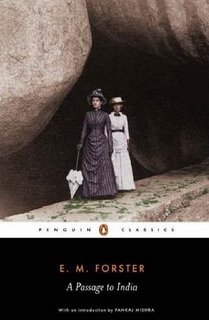 A Passage to India by Edward M Forster...written while England was still firmly in control of India, Forster's novel follows the fortunes of three English newcomers to India - Miss Adela Quested, Mrs. Moore, and Cyril Fielding - and the Indian, Dr. Aziz, with whom they cross destinies.
A Passage to India by Edward M Forster...written while England was still firmly in control of India, Forster's novel follows the fortunes of three English newcomers to India - Miss Adela Quested, Mrs. Moore, and Cyril Fielding - and the Indian, Dr. Aziz, with whom they cross destinies. Miss Quested and Mrs. Moore are good Brits in turn of the century India. They have the best intentions and want to meet real Indians and see the real India. When Dr. Aziz takes them to visit the Marabar Caves, they seem to be penetrating deep into the heart of India. However, Miss Quested is overwhelmed by the caves & accuses Aziz of attacking her & for all their good intentions, they are shown to be just as incapable of understanding Indians as the worst of their fellow Brits.
The clash of cultures makes for interesting reading. However, after a century of decolonization and independence, it's legitimate to ask whether places like India are better off today, as independent nations, than they were in 1900, as colonies. Forster makes the point that the English will never understand the Indians & can never be friends with them, but will Hindus ever understand Moslems & can they ever be friends? More importantly, even if the English never could befriend the Indians, wasn't their governance, at least, enlightened & constructive?
That's very essence of the story - to the question, can Indians and Britons be friends? That is the heart of the novel, as Dr. Aziz and Mr. Fielding struggle to be friends as their societies conflict and they offend each other through misunderstandings. Book highlights the psychology of how people avoid other different(culture) people.
I wonder this was source/inspiration for the recently movie "Crash"...!?
very interesting read and might help in understanding across-culture difference.
No comments:
Post a Comment